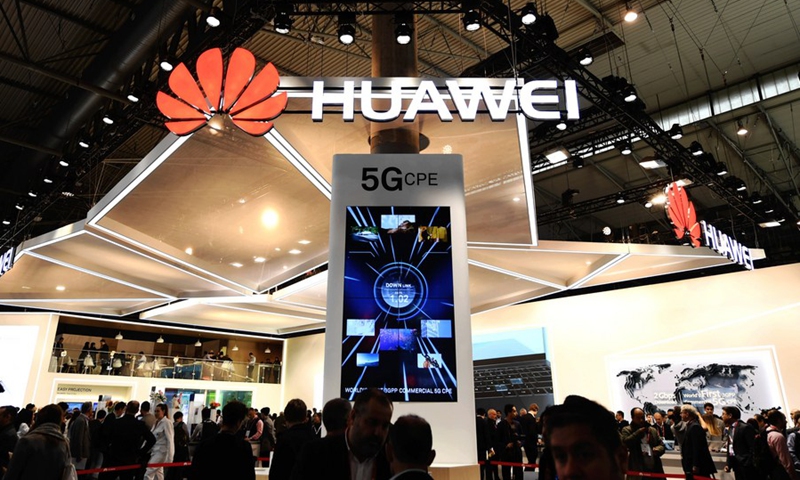Huawei joins effort in Zambia’s 5G rollout
China has set a milestone in its technological commitments to Africa, with tech giant Huawei working with Zambia’s mobile telecom operator MTN in a pilot program to roll out the African nation’s first 5G network.
Chinese technology offerings have played an indispensable role in developing the digital economy in the Africa, observers said, citing decades of sound China-African friendship as underpinning the popularity of Chinese-developed technologies in the continent.
The US government has put Huawei and dozens of other Chinese tech companies on its Entity List, cutting off crucial supplies to them, which has prompted Chinese tech trendsetters like Huawei to focus more on Africa and elsewhere for market exploration, they noted.
The Huawei-MTN tie-up rolled out a pilot 5G network on Tuesday, making Zambia one of the earliest adopters of 5G technology in the continent.
“The launch of the 5G network puts Zambia among the first 10 African countries currently piloting it,” the Xinhua News Agency said in a report on Wednesday, citing Zambia’s Minister of Science and Technology Felix Mutati. “I think what you (Huawei) are bringing to the table is creating endless possibilities and endless opportunities,” the minister said. In 2013, Huawei assisted MTN in building Zambia’s first 4G network.
Technologies and services that are crucial for digital prowess will be a pivotal area of cooperation between China and African countries, as the COVID-19 pandemic has impeded trade flows and increased the need for digital services, Song Wei, a research fellow at the Chinese Academy of International Trade and Economic Cooperation, a think tank under the Ministry of Commerce, told the Global Times on Wednesday.
For Africa, this means an urgent push to upgrade its digital infrastructure, Song said, and China-Africa ties, adding to Chinese tech firms’ established presence in the continent, makes Chinese offerings prioritized choices in the local markets.
Continuing a diplomatic tradition that China has followed for the past three decades – Africa as the first overseas destination for Chinese foreign minister in a new year – State Councilor and Foreign Minister Wang Yi visited Eritrea, Kenya and the Comoros from January 4 to 7, before visiting the Maldives and Sri Lanka.
The China-Africa Innovation Cooperation Conference was convened in mid-December in Wuhan, Central China’s Hubei province, with 15 scientific and technological cooperation deals signed between China and multiple African countries.
China’s cooperation with Africa in tech innovations has made progress in recent years, with China proactively implementing tech innovation action plans under the Belt and Road Initiative and sharing sci-tech achievements and experience with many African countries, Foreign Ministry spokesperson Wang Wenbin told reporters in mid-December.
China has signed government-to-government tech cooperation agreements with 16 African nations, according to Wang.
In another sign, Shenzhen-based handset maker Transsion, dubbed the cellphone king of Africa, has blazed a trail of putting the continent on track to readily available mobile connectivity.
Africa’s smartphone shipments shrank 2.3 percent in the third quarter of 2021 from the prior quarter, as component shortages facing manufacturers undercut signs of recovery in the local smartphone market, according to data from market research firm IDC.
Still, Transsion led the continent’s smartphone rankings in shipment terms in the quarter, with a 47.4 percent share, while Samsung took the second spot with 21.3 percent and Xiaomi was third with 6.1 percent, per IDC statistics
Underpinned by its success in the African market, Transsion, founded in 2006, floated its shares on the STAR Market in Shanghai in 2019.
Also, behind the burgeoning popularity of digital wallets in Africa that allows local people to make money transfers via smartphones, are Chinese technologies. For instance, M-Pesa, a major mobile money service provider in Africa, uses Huawei’s enterprise solution. Beijing Kunlun Technology’s web browser arm Opera is behind Nigerian e-commerce and payment firm OPay.
Analysts said that Africa has actually turned out to be a growingly important destination for Chinese tech firms’ overseas expansion, in light of US sanctions on Chinese tech firms.
Huawei and ZTE, among other Chinese tech giants with established footprint in the continent, are expected to pivot toward the African market where Chinese firms aren’t subject to groundless restrictions, Fu Liang, an independent tech analyst, told the Global Times on Wednesday.
Still, according to Song, the competition in the African market is intensifying, as the US and Europe also have plans to penetrate the local marketplace for infrastructure.
Photo taken on Feb. 26, 2018 shows a screen displaying the 5G technology at the booth of China’s telecom giant Huawei during the 2018 Mobile World Congress (MWC) in Barcelona, Spain.(Photo: Xinhua)




